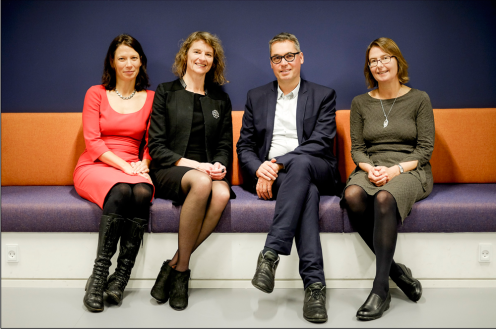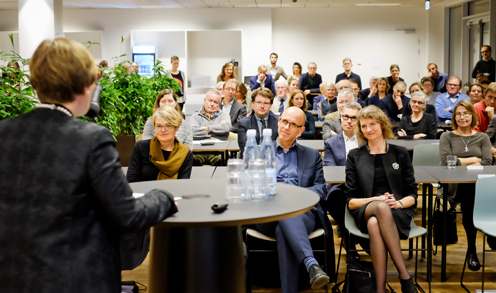International research centre in privacy opens
The Danish National Research Foundation’s Centre for Privacy Studies (PRIVACY) is now officially opened at a ceremony at University of Copenhagen. The centre brings together a multidisciplinary team of researchers in the fields of architecture, religious culture, law and political ideas. They will examine the historical development of the notion of privacy, which in an age of surveillance is more relevant than ever.

From left: Associate Professor Helle vogt, Professor and Centre Director Mette Birkedal Bruun,
Professor, dr.phil., PhD, architect Peter Thule Kristensen and Senior Lecturer Charlotte Christensen-Nugues. Photo: Adam Garff
The private is traditionally something you should not pry into. Nevertheless, it is what a number of top researchers within four different disciplines have received DKK 50 million from The Danish National Research Foundation to do. The new Centre for Privacy Studies at the University of Copenhagen headed by Professor of Church History Mette Birkedal Bruun, will examine the notion of privacy from a historical perspective in order to shed light on an area long overlooked by researchers.
- In a time of new surveillance possibilities and data collection, as never seen before, the boundaries for the private is under pressure. We discuss frequently the notion of privacy and the right to a private life, but we do not actually know so much about it as a concept and cultural phenomenon. In PRIVACY we are taking a step back to examine how the notion of privacy has developed, and how it functions historically, says Mette Birkedal Bruun.
PRIVACY has been conceived as an interdisciplinary project, and its corner stones are the centre's four Danish and four international core scholars from the fields of architecture, religious culture, legal history and history of ideas. This also means that the centre is a collaboration between The Faculty of Theology and The Faculty of Law, University of Copenhagen, The Royal Danish Academy of Fine Arts, Schools of Architecture, Design and Conservation, and Lund University. The centre is housed by The Faculty of Theology, University of Copenhagen, and it is here that the approximately 10 new researchers will stay.
Centre opening in new surroundings at The Faculty of Theology
The centre was officially opened with a ceremony at The University of Copenhagen on 1 November in the new buildings on South Campus, the home of The Faculty of Theology and now also the home to PRIVACY. At the inauguration ceremony, it was emphasised that even though the historical research is about the past, its role is to give us the tools and knowledge that can make us wiser about the present. A premise for PRIVACY's research in the Early Modern period is that there are strong similarities between the role of the private sphere back then and today.
- People use the concept of 'privacy' to structure their society and their existence. This was true in the Early Modern period and this applies today. We divide our lives in private and professional, private and public or private and shared by means of zones, there may be physical and concrete or abstract," said Mette Birkedal Bruun in her opening speech.

Opening at PRIVACY. Professor Liselotte Højgaard from The Danish National Research Foundation is giving a speech. Photo: Adam Garff.
Professor Liselotte Højgaard, chair of the Danish National Research Foundation, added in her speech how the latest ‘privacy issues’ not only drive political debates but also influence popular culture.
-Dan Brown's new crime fiction 'Origin' with artificial intelligence and Big Data in the middle of a high-tension international theological drama illustrates that PRIVACY research is particularly relevant and, almost “breaking news", said the Professor in her speech.
The centre will run for six years with the possibility of extension.
Contact
Professor Mette Birkedal Bruun
The Faculty of Theology
Tel.: +45 2487 4648
Mail: mbb@teol.ku.dk
About PRIVACY
The centre will investigate how the notion of privacy developed from the Early Modern Period toward the importance it has today by systematically examining the delimitation of the private sphere within architecture, religious culture, legislation and political approach based on the period 1500-1800.
The research is based on the 11 cases from Denmark, the Netherlands, Germany, the UK and France.
The centre’s core scholars are:
• Professor in Church History Mette Birkedal Bruun, Faculty of Theology, UCPH
• Associate Professor of Legal History Helle Vogt Faculty of Law, UCPH
• Professor of Architecture Peter Thule Kristensen, KADK - Architectural and design schools
• Associate Professor in History of Ideas Charlotte Christensen-Nugues, Lund University
• Jill Bepler, Head of Department, Herzog August Bibliothek, Wolfenbüttel
• Annabel Brett, Reader in History of Political Thought, University of Cambridge
• Philippe Cocatre-Zilgien, Professor of Legal History, Université de Paris II Panthéon-Assas
• Maarten Delbeke, Professor of History and Theory of Architecture, Ensted Transithavn, Zurich
Furthermore, 8-10 new postdocs and Ph.D.’s are expected.
